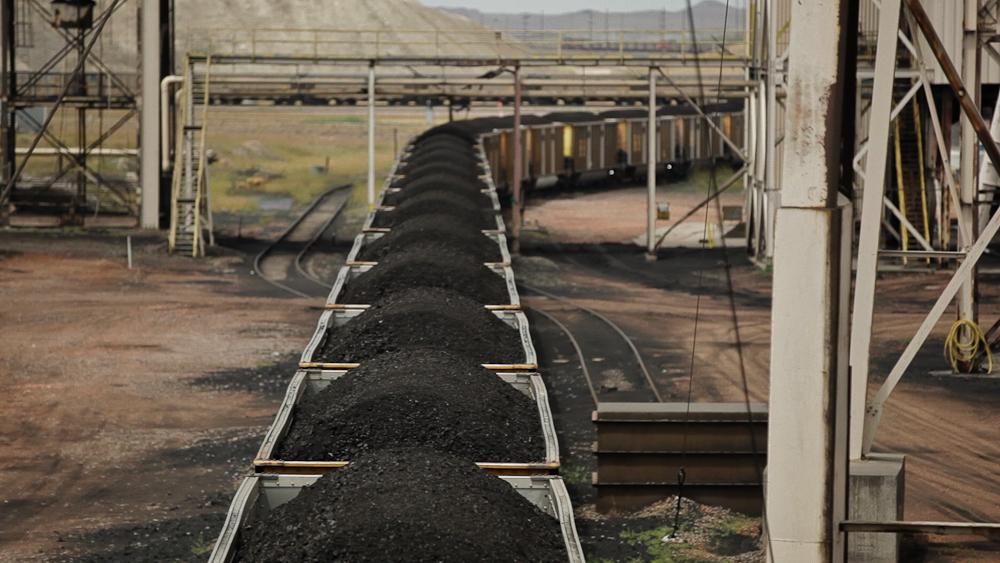
Coal like this from a Wyoming mine could be heading to Longview, Washington.
Katie Campbell, KCTS9 / EarthFix
The Washington Department of Ecology on Monday denied a permit for a proposal to build North America’s largest coal export terminal in Longview, Wash, citing a raft of concerns about impacts to the region’s environment, transportation and culture.
Millennium Bulk Terminals, the last standing of a half dozen proposals to export coal to Asia from terminals built in the Pacific Northwest, needed a water quality from Ecology to move forward with construction.
The state rejection is a victory for environmental groups and local tribes, who have fought the construction of the Longview terminal and other coal, oil and natural gas terminals throughout the region for more than five years. It also is a blow to supporters of the $650 million project, who said the state sent a message of regulatory hurdles too high to clear.
Ecology Director Maia Bellon said the environmental harm was too great — and could not be offset — from a facility seeking to move 44 million metric tons of coal each year, stockpiling coal eight stories high and 50 football fields wide.
Approving the project would have meant filling in 24 acres of wetlands, dredging 41 acres of the Columbia River and adding 16 mile-long coal trains per day through Cowlitz County.
“There are simply too many unavoidable and negative environmental impacts for the project to move forward,” Bellon said.
Millennium Bulk Terminals plans to appeal the decision to the state’s Environmental and Land Use Hearings Office.
"Multiple recent decisions by the agency seem biased against the Longview community, and particularly blind to the need for employment opportunities in Cowlitz County," CEO William Chapman said in a statement.
Since 2010, six projects to export coal have been proposed in Oregon and Washington along the Columbia River and in Puget Sound. Since then, not one has been built — all of them halted by environmental or land-use permits, tribal fishing rights or a suffering coal market.
“The state did the right thing today, standing up for clean water, public health, and the Pacific Northwest’s iconic endangered salmon runs,” said, Jasmine Zimmer-Stucky, co-director of the group Power Past Coal. “Washington state and the city of Longview deserve better than empty promises from the dying coal industry.”
Ecology denied the Longview terminal’s water quality permit based not only on impacts to water, but nine wide-ranging categories including air quality, vessel traffic, rail capacity and safety, noise pollution and tribal resources. According to Ecology, a fully operational terminal would compound rail and vessel congestion. It would delay tribes’ access to fishing sites. And it would have increased the diesel pollution, a known cancer risk, in neighborhoods along rail lines.
Monday's decision was cheered by Columbia River tribes. The Cowlitz Indian Tribe, which has longstanding ties to the region where the terminal is proposed, thanked the state for rejecting the permit.
"The proposed Coal Terminal is another threat to our way of life, culture, and subsequently our future generations’ right to the use and enjoyment of natural resources within our homelands," the statement said.
“It comes as a great relief for all of us here,” said Chuck Sams, spokesman for the Confederated Tribes of the Umatilla Indian Reservation. “Protecting our natural resources, that not just the tribes but all Washingtonians and U.S. citizens rely upon.”
Ecology’s broad scope angered project supporters. Washington’s business community took aim at the decision, with several groups issuing statements calling the process a charade and questioning the grounds for the denial, saying the agency appeared to be looking for any reason to reject the project because it involved coal.
“It’s pretty outrageous,” said Lee Newgent of the Washington State Building and Construction Trades Council. “Are they going to do that for every single project we’re trying do? Probably nothing would ever get built.”
Kris Johnson, president of the Association of Washington Business, said the decision turns away an investment in good jobs in a part of Washington that truly needs them. The project promises 300 full-time jobs, with an additional 2,650 for construction. Cowlitz County’s unemployment rate is currently around 6 percent, and historically runs higher than the national average.
“From the beginning, it has faced unprecedented regulatory hurdles that send the wrong message to employers about Washington’s openness to investment,” Johnson said of the project.
On a conference call with reporters, Ecology director Bellon dismissed any notion of bias in the process.
“I feel very strongly that is a solid decision and feel in no way that it was arbitrary,” she said.
Bellon said while the scope of this coal terminal is unprecedented, the department has in the past relied on factors other than water quality to deny permits, because permits are required to comply with other state laws.
